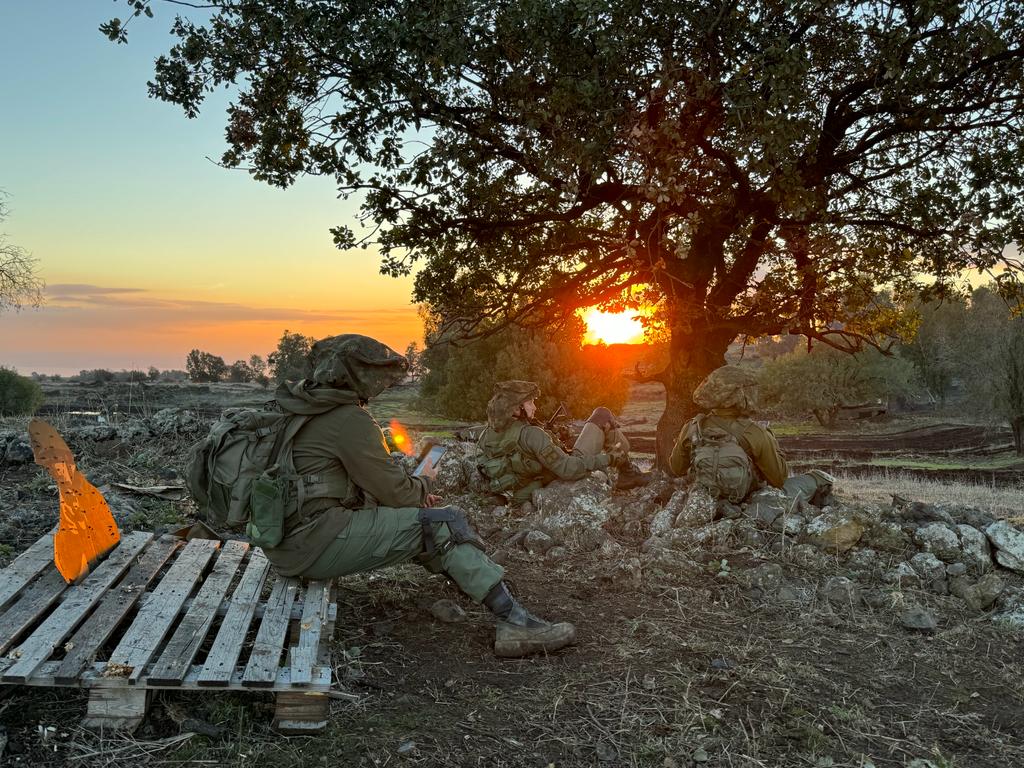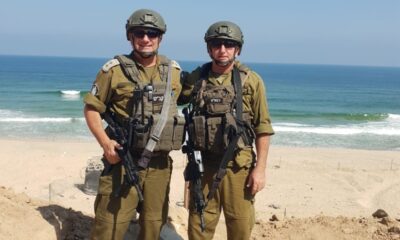
Featured Item

‘We’re ready,’ says soldier on Lebanon border
Amid reports of reinforcements being sent to the northern border, Israel Defense Forces (IDF) Company Leader Roy Rizel, 31, who oversees three platoons in the Golani Brigade stationed on Israel’s Lebanon border, says his soldiers have long been prepared for this mission.
While the media’s attention remains widely focused on the south of Israel where the country continues fighting Hamas in Gaza, soldiers on the northern front are determined to curtail the serious threat posed by Hezbollah. Many are led by Rizel, who began and completed his military service in the Golani Brigade, one of the IDF’s most decorated infantry units. Today he serves in the brigade as a company leader, heading up three platoons.
After being drafted to the brigade in 2011, Rizel did a commander and officer course and commanded his first in platoon in Gaza in 2014, which gave him the combat experience on which he currently draws. Once discharged, he was drafted in the Golani Brigade’s Reserves Unit. “Our mission is mainly linked to the Lebanese border,” he says. “We’ve been prepared for this for a long time.”
On 7 October, while home in central Israel, Rizel and his family heard the Iron Dome missile defence system kick into gear. “It felt different because there were hundreds of missiles,” he recalls. “I immediately realised that something had happened and by 07:30, I’d already seen the videos of Hamas’s trucks and I told my wife that we were in a war. About an hour later, I got the call to draft my entire company of soldiers and move as fast as we could to our unit in the north. By 20:00, we were all on the border, in our gear, and armed with our guns.”
Rizel says Hezbollah was already on the border when they arrived. “We managed to make massive progress and caused losses to the enemy in the first few days,” he says. “Afterwards, Hezbollah stepped back, which gave us time to spread all over the border in the surrounding kibbutzim and between the villages. Now we’re maintaining a kind of silent war with them every day – they’re shooting missiles at our antennas and bases, and we’re shooting back at them.”
They had, in fact, anticipated an attack from the northern border rather than from the south, when the Hamas massacre took place on 7 October, Rizel says. Though Hezbollah’s involvement remains in question, the fact that Israeli troops arrived at the Lebanon border within hours of the attacks made them rethink any intention of capitalising on the resulting chaos.
“People aren’t aware how much we prepared for this,” Rizel says. “The training that we’ve done for the past 10 years was aimed at the northern border, at the possibility of Hezbollah units crossing here and targeting nearby Israeli settlements. We also have many outposts near the border that the enemy is unaware of.”
Rizel talks of the difficulties of being away from his wife and two children, aged six and eight, for so long, and reuniting with them only for brief visits. “For the first month, it was clear why it was so important, why I had to do this and be away, but now it’s been more than 120 days, so my kids are starting to question it. Every time I leave, it’s hard on them. My youngest started first grade just before 7 October, and I didn’t take part in any of his school events.”
Yet he remains driven by his mission. He’s also committed to keeping up the morale of his soldiers. “I’m trying to give them as much leave as I can, which isn’t a lot,” he says. He managed recently to arrange a get together with soldiers and their families at a kibbutz in central Israel.
Overseeing a company of soldiers who are reservists and have to be away from their families, jobs, or businesses is challenging, Rizel says. “Even I work a regular, boring day job, I’m a programmer, which is very different to what I’m doing here.” Everything has stopped for his men, he says. “Some have got caught up in debt, so we help them with funds and are working with the authorities to ensure that they don’t take on any damages.”
Operating in cold and mountainous conditions with gear not designed for such terrain can also be challenging. Yet, says Rizel, with his men having served in the brigade before, they are familiar with the region and know how to handle the cold. They find solutions including a generator used to provide heat in an open field beneath the trees where many are deployed by the border.
“At first, we had a hard time getting ammunition because most of the supplies went to the south, but it was quickly corrected by the army after we got drafted,” says Rizel. “Ever since, we’ve become only stronger. We’re trying to find creative answers to challenges – like finding gear that will allow us to carry heavier weights. The army helps us as much as it can. Though most of the funds are going to the south for now, we can see that the centre of the war is starting to shift to the north. Everybody here knows that the main threat is Hezbollah.”
Though Rizel says soldiers sometimes find international condemnation upsetting, they are clear about who they are, and who they’re up against. “We know who our enemy is, we know that they don’t want to talk about peace. I don’t even think that the land matters to them, they mostly want to hurt us, our children, our families, and our friends because we’re free Jews in Israel.
“They aren’t looking for compassion, patience, or any peace at all, not from the south or the north, and we’re prepared for that. It’s a shame that there are some forces in the world that can’t acknowledge that, but the future will tell the story.”










